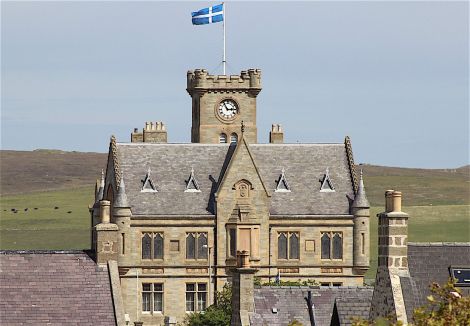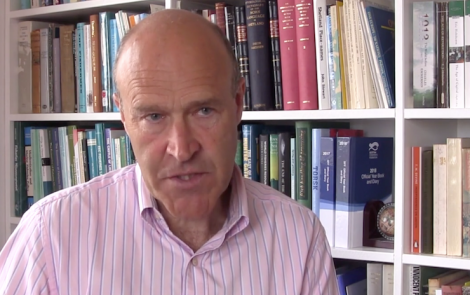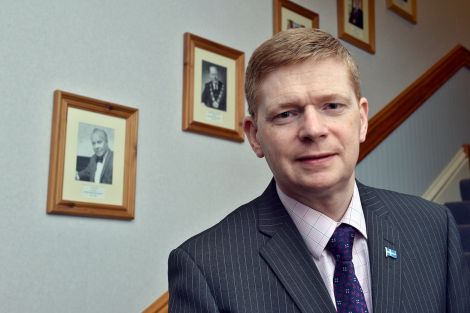Council / Shetland starts quest for more powers with online debate
Council convener Malcolm Bell says local government has become nothing more than a ‘delivery arm of central government’
THE campaign to restore local government and ultimately secure more self-determination powers for Shetland kick-started last night (Tuesday) with a well-attended virtual summit hosted by broadcaster and journalist Lesley Riddoch on behalf of Shetland Islands Council.
A wide range of speakers argued that it was “normal” for island communities to have a degree of “self-governing”, that communities in control of their own affairs were usually more confident and successful, and that Shetland could be considered the odd one out for not having such powers.
More than 120 people had signed in to Reflections on Self-Determination – an Islands Perspective to listen to four presentations followed by a short Q&A session.
Dr Andrew Jennings of the Institute of Northern Studies, based at Shetland College, gave an overview of the many different forms of self-governing island communities around the world enjoy and concluded that for islands it was “normal” to have a special status within government, and that Shetland was “by no means too small for that”.
Aki Johansen, a Faroese representative to the UK based in London, gave some insight into how Shetland’s northerly neighbour won its extensive powers from Denmark back in 1948, and how these were put to good use making Faroe the envy of many islanders here.
Meanwhile, as a crown dependency the Isle of Man has full authority over all domestic matters while buying in services such as defence and foreign affairs.
Describing the island’s politics as a balancing act, government official Peter Boxer explained that the Isle of Man is neither part of the UK nor the EU, and also does not receive any funds from the UK, yet is doing 95 per cent of its trade with the UK.
Become a member of Shetland News
Former Shetland Fishermen’s Association chief executive John Goodlad, a former parliamentary candidate for the Shetland Movement, spoke of a little known referendum in 1978 which resulted in a 90 per cent mandate for Shetland’s constitutional position to be considered should Scotland get its own parliament following the 1979 referendum, but that never happened.
Current council convener Malcolm Bell made the point that the powers of local government have been eroded for many years, a process that started long before the SNP came to power in 2007.
“The reality is that local government in the UK has been diminished over several decades, it didn’t start with the SNP government. Little by little and bit by bit our powers and our control has been diminished,” Bell said.
“It has got worse and has accelerated over the last few years (…) and effectively what we have now is a local government system in Scotland that is neither ‘local’ nor ‘government’, I would content, we are a delivery arm of central government.”
Being asked for their vision of local democracy in Shetland, Bell said that accepting the status quo would be managing decline.
“There is a broad spectrum of views, everything from a more empowered local government right up to what we have heard here tonight from Faroes. But I don’t think we will be making that leap in one jog, it’s going to be a process of evolution,” the SIC convener said.
Jennings said he wouldn’t want to suggest which powers Shetland might go for and
“in a more general sense” he “would like to see a more confident community making many of its own decisions, having responsibilities for the most important aspects of its economy, having a bigger role to play internationally (…) and doing this in partnership with Scotland rather than standing alone in splendid isolation”.
Goodlad was more outspoken and suggested that the debate over indyref2 would provide new opportunities to bring Shetland’s constitutional position into play.
“I think the constitutional debate in Scotland affords us with a huge opportunity, because that debate is going to be focussed on the big question: ‘if the people of Scotland want to have a second independence referendum, they should have a second referendum (…),” he said.
“And in a small way Shetland should be saying exactly the same. If Shetlanders want to have a specific degree of island autonomy, setting out a degree of legislative and fiscal autonomy, that’s democracy.”
He suggested that such a quest could hardly be turned down by the Scottish Government as they are arguing for exactly the same in the Scottish context.
In terms of what island autonomy could mean in practical terms, Goodlad suggested extending the successful islands-based management of the inshore shellfish fishery to other species such as whitefish.
He added: “The huge debate that has dominated Shetland over the past few years has been the [Viking Energy] wind farm. It is absolutely ridiculous that the planning decision on that has been taken by the Scottish Government. That’s a decision that should have been taken here.
“I am not arguing that it should have been for or against, but that’s a decision that Shetlanders through their elected representatives should have taken.
“That’s the kind of vision I have for Shetland: very practical, it’s not airy-fairy, it’s not academic; we need real legislative and fiscal autonomy.
“As Malcolm [Bell] is saying, we want local government, both local and government.”
Become a member of Shetland News
Shetland News is asking its readers to consider paying for membership to get additional perks:
- Removal of third-party ads;
- Bookmark posts to read later;
- Exclusive curated weekly newsletter;
- Hide membership messages;
- Comments open for discussion.
If you appreciate what we do and feel strongly about impartial local journalism, then please become a member of Shetland News by either making a single payment, or setting up a monthly, quarterly or yearly subscription.































































